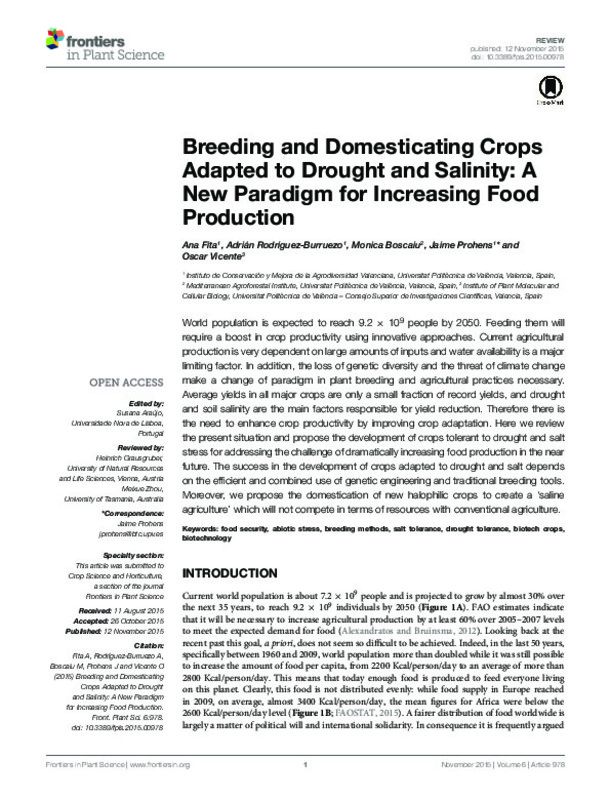JavaScript is disabled for your browser. Some features of this site may not work without it.
Buscar en RiuNet
Listar
Mi cuenta
Estadísticas
Ayuda RiuNet
Admin. UPV
Breeding and domesticating crops adapted to drought and salinity: a new paradigm for increasing food production
Mostrar el registro sencillo del ítem
Ficheros en el ítem
| dc.contributor.author | Fita, Ana
|
es_ES |
| dc.contributor.author | Rodríguez Burruezo, Adrián
|
es_ES |
| dc.contributor.author | Boscaiu Neagu, Mónica Tereza
|
es_ES |
| dc.contributor.author | Prohens Tomás, Jaime
|
es_ES |
| dc.contributor.author | Vicente Meana, Óscar
|
es_ES |
| dc.date.accessioned | 2016-11-07T14:01:35Z | |
| dc.date.available | 2016-11-07T14:01:35Z | |
| dc.date.issued | 2015-11 | |
| dc.identifier.issn | 1664-462X | |
| dc.identifier.uri | http://hdl.handle.net/10251/73406 | |
| dc.description.abstract | [EN] World population is expected to reach 9.2 × 109 people by 2050. Feeding them will require a boost in crop productivity using innovative approaches. Current agricultural production is very dependent on large amounts of inputs and water availability is a major limiting factor. In addition, the loss of genetic diversity and the threat of climate change make a change of paradigm in plant breeding and agricultural practices necessary. Average yields in all major crops are only a small fraction of record yields, and drought and soil salinity are the main factors responsible for yield reduction. Therefore there is the need to enhance crop productivity by improving crop adaptation. Here we review the present situation and propose the development of crops tolerant to drought and salt stress for addressing the challenge of dramatically increasing food production in the near future. The success in the development of crops adapted to drought and salt depends on the efficient and combined use of genetic engineering and traditional breeding tools. Moreover, we propose the domestication of new halophilic crops to create a ‘saline agriculture’ which will not compete in terms of resources with conventional agriculture | es_ES |
| dc.language | Inglés | es_ES |
| dc.publisher | Frontiers Media | es_ES |
| dc.relation.ispartof | Frontiers in Plant Science | es_ES |
| dc.rights | Reconocimiento (by) | es_ES |
| dc.subject | Foodsecurity | es_ES |
| dc.subject | Abioticstress | es_ES |
| dc.subject | Breeding methods | es_ES |
| dc.subject | Salt tolerance | es_ES |
| dc.subject | Drought tolerance | es_ES |
| dc.subject | Biotech crops | es_ES |
| dc.subject | Biotechnology | es_ES |
| dc.subject.classification | BOTANICA | es_ES |
| dc.subject.classification | GENETICA | es_ES |
| dc.subject.classification | BIOQUIMICA Y BIOLOGIA MOLECULAR | es_ES |
| dc.title | Breeding and domesticating crops adapted to drought and salinity: a new paradigm for increasing food production | es_ES |
| dc.type | Artículo | es_ES |
| dc.identifier.doi | 10.3389/fpls.2015.00978 | |
| dc.rights.accessRights | Abierto | es_ES |
| dc.contributor.affiliation | Universitat Politècnica de València. Escuela Técnica Superior de Ingeniería Agronómica y del Medio Natural - Escola Tècnica Superior d'Enginyeria Agronòmica i del Medi Natural | es_ES |
| dc.description.bibliographicCitation | Fita, A.; Rodríguez Burruezo, A.; Boscaiu Neagu, MT.; Prohens Tomás, J.; Vicente Meana, Ó. (2015). Breeding and domesticating crops adapted to drought and salinity: a new paradigm for increasing food production. Frontiers in Plant Science. 6(978):1-14. doi:10.3389/fpls.2015.00978 | es_ES |
| dc.description.accrualMethod | S | es_ES |
| dc.relation.publisherversion | https://dx.doi.org/10.3389/fpls.2015.00978 | es_ES |
| dc.description.upvformatpinicio | 1 | es_ES |
| dc.description.upvformatpfin | 14 | es_ES |
| dc.type.version | info:eu-repo/semantics/publishedVersion | es_ES |
| dc.description.volume | 6 | es_ES |
| dc.description.issue | 978 | es_ES |
| dc.relation.senia | 299833 | es_ES |
| dc.identifier.pmcid | PMC4641906 | en_EN |








